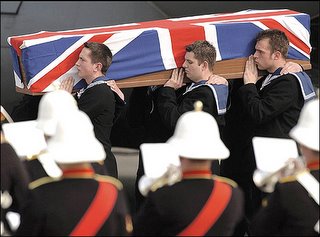The Special Relationship On The Rocks

This is devastating. One of the top British commanders in Iraq, Brigadier General Nigel Alywin-Foster, has issued a blistering critique of gung-ho American military behavior in the war zone:
American soldiers, says Brig Aylwin-Foster, were "almost unfailingly courteous and considerate". But he says "at times their cultural insensitivity, almost certainly inadvertent, arguably amounted to institutional racism".
The US army, he says, is imbued with an unparalleled sense of patriotism, duty, passion and talent. "Yet it seemed weighed down by bureaucracy, a stiflingly hierarchical outlook, a predisposition to offensive operations and a sense that duty required all issues to be confronted head-on."
Brig Aylwin-Foster says the American army's laudable "can-do" approach paradoxically led to another trait, namely "damaging optimism". Such an ethos, he says, "is unhelpful if it discourages junior commanders from reporting unwelcome news up the chain of command".
But his central theme is that US military commanders have failed to train and educate their soldiers in the art of counter-insurgency operations and the need to cultivate the "hearts and minds" of the local population.
Now before you dismiss this guy as just another whining Brit, understand this soldier is highly regarded. American General David Petraeus, who commanded Aylwin-Foster in Iraq, remarked in the Washington Post that "he is a very good officer, and therefore his viewpoint has some importance, as we do not think it is his alone."
General Aylwin-Foster is indeed someone who greatly supports the war effort. He told right-wing blogger Robert Alt in an interview that "I don't think it's an overstatement at all to say that this (Iraq) is a life changing experience. . . . It's not often that you get to be around for the birth of a nation. . . . That's something to be cherished."
One of the great doubts I had about the war from the beginning was that I just couldn't imagine how, say, a 20 year old from Cedar Rapids or Tuscaloosa was going to be able to rebuild a place as foreign and fucked-up as Iraq. I feared that when hoo-rah bluster met the hard work of occupation, it would be incredibly hard for our army to change gears. Defeat the Iraqi army, sure. Our military is unbeatable at actual, straight-up warfare. But, according to Alywin-Foster, that central focus on all-out combat turns out to be a grave part of the problem in Iraq as well:
While US officers criticized their allies for being too reluctant to use force, their strategy was "to kill or capture all terrorists and insurgents: they saw military destruction of the enemy as a strategic goal in its own right". In short, the brigadier says, "the US army has developed over time a singular focus on conventional warfare, of a particularly swift and violent kind".
Such an unsophisticated approach, ingrained in American military doctrine, is counter-productive, exacerbating the task the US faced by alienating significant sections of the population, argues Brig Aylwin-Foster.
What he calls a sense of "moral righteousness" contributed to the US response to the killing of four American contractors in Falluja in the spring of 2004. As a "come-on" tactic by insurgents, designed to provoke a disproportionate response, it succeeded, says the brigadier, as US commanders were "set on the total destruction of the enemy".
He notes that the firing on one night of more than 40 155mm artillery rounds on a small part of the city was considered by the local US commander as a "minor application of combat power". Such tactics are not the answer, he says, to remove Iraq from the grip of what he calls a "vicious and tenacious insurgency".
Brig Aylwin-Foster's criticisms have been echoed by other senior British officers, though not in such a devastating way. General Sir Mike Jackson, the head of the army, told MPs in April 2004 as US forces attacked Falluja: "We must be able to fight with the Americans. That does not mean we must be able to fight as the Americans."
The question is now how the Administration and the political appointees in the Pentagon will react to this rare moment of honesty. We may already have a clue from the Post article:
"I think he's an insufferable British snob," said Col. Kevin Benson, commander of the Army's elite School of Advanced Military Studies, referring to Aylwin-Foster. Benson said he plans a rebuttal.
I wonder of George Bush will now single out the good general for "undermining morale" and "giving comfort to the enemy".
In Washington, like with the war on Terror, combat never really ends.
Neither does the butcher bill.


5 Comments:
Spencer
Let me put a little different spin on that article.
First of all it is reproduced (Large PDF file) in the journal of the US Army Command and General Staff Collage, something that certainly did not have to happen unless some people in the Army felt it had some value as a critique. It is not the hatchet job that sometimes represents a segment of unofficial British military comment. (And there is segment of unofficial American opinion that returns the complement, neither of much value) It does have some good points.
The military professional journals have always allowed a reasonable amount of discussion of the wisdom of military policy and practice. That an article would provide an alternative viewpoint for discussion is not surprising. What is not allowed is anything that challenges the subordination of the military to civilian control.
If you note in the article that several of his footnotes are discussions with anonymous senior officers. At points he is repeating some internal Army criticism, sometimes most of which I have seen elsewhere. A number of items where he says “Army” he is really talking about the results of political decisions, by the current Sec Def and to lesser extent from the previous administration that the Army had to execute. This includes a number of decisions on how to execute the 2003 campaign. As this is a foreign officer’s article it can be republished even though it pushes the bounds on criticism of the political leadership.
Certainly, there are items of the authors own opinion that are likely to rankle, I suspect one reason it was republished is that it says some things a serving officer should not say before retiring because of the Civilian control issue.
This comment has been removed by a blog administrator.
This comment has been removed by a blog administrator.
This comment has been removed by a blog administrator.
the correct link
I hate the blogger comment section
Post a Comment
<< Home